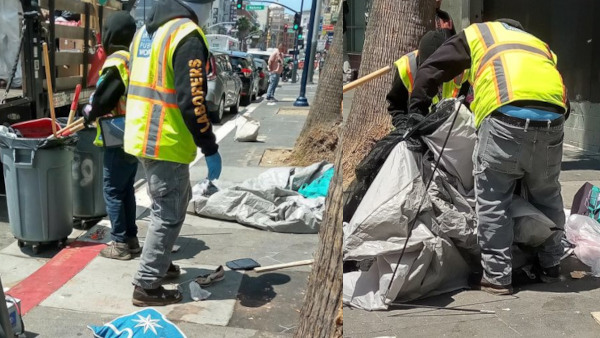
SAN FRANCISCO, CA — On a rainy day in 2021, I witnessed San Francisco workers throw away a woman’s leukemia medication during an encampment sweep. They also forced her to move without offering her a shelter bed, in violation of City policies and an ordinance requiring the City to offer shelter before it can clear encampments.
When the Coalition on Homelessness filed a lawsuit against the City in 2022 over this practice, we provided documentation that San Francisco had cited and arrested more than 3,000 unhoused people without first offering shelter and illegally trashed their belongings, including medicines. The City never contested these facts. As a result, the federal district court determined that we are likely to succeed and granted a preliminary injunction. Under the federal injunction, San Francisco could clear encampments if it made a genuine offer of available shelter to those who had nowhere else to go. Thanks to our lawsuit, San Francisco has reopened the shelter waitlist and increased shelter and housing placements.
But in June, the U.S. Supreme Court overturned Grants Pass v. Johnson, which barred cities from citing and arresting people for sleeping outside when no shelter is available. At a recent campaign event, Mayor London Breed promised to “be very aggressive and assertive in moving encampments, which may even include criminal penalties.”
That would be a mistake. As the past few years have shown, we make progress as a city only when we work diligently to move people into affordable housing or emergency shelter.
During a typical sweep operation, a unit averaging 18 City workers from six City departments—including police officers and firefighters—arrive at an encampment and order people to move. They stand and watch as unhoused people scramble to collect their belongings and leave as quickly as possible. A few hours later, when the City workers find out which shelter beds are available—if there are any—they tell a few lucky people and usually transport them to shelter. Others are out of luck.
Encampment sweeps violate human rights and undermine trust between outreach workers and unhoused individuals. They’re also expensive and ineffective, costing over $5 million per year that could be better spent on housing. In the past, when San Francisco actually carried out thoughtful encampment resolutions in which outreach workers took the time to assess needs and worked with residents over a couple weeks, most moved into permanent housing or shelter and many were placed in treatment. With more aggressive sweeps, only about 35% are placed and just in temporary shelter.
Meanwhile, housed San Franciscans are frustrated by the effects of thousands living on the streets without sanitation, their health rapidly deteriorating.
Penalizing our neighbors won’t reduce homelessness in San Francisco or make tents disappear. In fact, issuing fines unhoused people can’t pay and arresting them for sleeping outside when they have nowhere else to go only makes it harder for them to get off the streets. The research is clear on this.
If you are constantly moved around while the government seizes or destroys the documents you need to confirm your identity and prove your eligibility for assistance, it becomes nearly impossible to apply for limited services or to keep in contact with an outreach worker who finally has an appropriate placement to offer. A criminal record, warrant, or unpaid court fine often pose additional barriers to securing benefits, employment, and permanent housing.
Providing a safe place to sleep gives people an opportunity to stabilize and rebuild their lives. Centering skilled outreach workers who know their clients and can navigate the bureaucracy leads to much better outcomes than disruptive sweeps for unhoused individuals. One great example is the Public Health department’s focus on the Castro District leading to near comprehensive placement of unhoused neighbors there.
Instead, the Supreme Court just made homeless people’s chance at achieving housing security even more of a long shot.
Republished by permission of the Street Sheet
